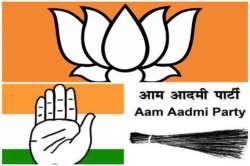Narela Constituency: Historical place with modern-day issues
Delhi's Narela Assembly constituency, a place with historical importance, is struggling with present-day issues of bad roads, lack of proper transport and water supply. The history of Delhi's Narela can be traced back to Harappa and Indus Valley Civilisation and it also finds mention in the 'Tuzuk-e-Jahangiri', the autobiography of Mughal emperor Jahangir.

Delhi's Narela Assembly constituency, a place with historical importance, is struggling with present-day issues of bad roads, lack of proper transport and water supply. The history of Delhi's Narela can be traced back to Harappa and Indus Valley Civilisation and it also finds mention in the 'Tuzuk-e-Jahangiri', the autobiography of Mughal emperor Jahangir.
Most of the localities in the constituency are rural. Villages, including Lampur, Akbarpur Majra, Bakhtawarpur, Bakouli, Bankner, Bhorgarh, Budhpur, Ghoga, Hamidpur, Hiranki and Holambi Kalan are part of the constituency.
Also part of the constituency are villages of Holambi Khurd, Iradat Nagar, Jhangola, Jindpur, Khampur, Khera Kalan, Shahpur Garhi, Singhola, Singhu, Sungerpur, Tajpur Kalan and Tigipur.
Located on the border of Delhi and Haryana, the area is just off the Grand Trunk Road -- one of Asia's oldest and longest roads which had linked the Indian subcontinent with Central Asia.
Narela was developed as the third mega sub-city project of Delhi Development Authority (DDA) in the urban extension project of Delhi, after Rohini Sub City and Dwarka Sub City.
While the city had witnessed several waves of changes, the constituency, however, more or less, has been facing the basic issues with a large part of it being considered unauthorised.
According to locals, the main and basic survival issues they face are lack of water supply and sewers, traffic jams, narrow lanes, bad condition of roads with potholes, and lack of a proper public transport system. Even the metro is yet to reach the area. The extension of Phase IV of the Delhi Metro Red Line will touch Narela with the expected date of the Rithala-Narela extension completion by 2024.
The Narela Industrial Area and the Anaj Mandi makes the place crucial from the business and commercial point of view.
Having 2,52,467 voters with 1,13,118 females, the constituency has a sex ratio of 812 -- below the state's Gender Ratio of 824. Interestingly, all the five MLAs elected from the seat between 1993 and 2015, were males.
In 2015, AAP's Sharad Chauhan bagged the seat getting 59.97 per cent of total votes. In 2015, a total of eight male candidates contested from the seat. All the major parties, including BJP, Congress, AAP, BSP, Shiv Sena and CPI-M-L had contested the seat that year.
From 1993 to 2008, the seat was a segment within the East Delhi Lok Sabha constituency, before which it was a part of Metropolitan Council segment.
After the delimitation of 2008, Narela is now an assembly segment within the North West Delhi Lok Sabha constituency.
Between the 1993 and 2015 assembly elections, the seat has elected Congress thrice in 1998, 2003 and 2008. It has elected the BJP in 1993 and 2013, when the Congress and AAP formed a government for 49 days.
The city is again going for polls on February 8 with AAP, Congress and BJP has the top contenders. The election is crucial for all three parties. The AAP had bagged 67 of the 70 Assembly seats in the 2015 polls in Delhi. The BJP got the remaining three while the Congress, which ruled the city for 15 years, drew a blank.